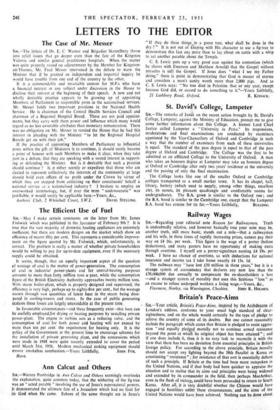The Efficient Use of Fuel
Sia,—May 1 make certain comments on the letter from Mr. James Fishwick which was published in the Spectator of February 9th ? It is true that the vast majority of domestic heating appliances are extremely inefficient, but there arc modern designs on the market which show an efficiency of nearer fifty per cent. This represents a considerable improve- ment on the figure quoted by Mr. Fishwick, which, unfortunately, is correct. The problem is really a matter of whether private householders would be willing to pay for up-to-date equipment, even if the necessary supply could be obtained.
It seems, though, that an equally important aspect of the question of wastage of coal is the matter of power-generation. The consumption of coal in industrial power-plants and for central-heating purposes amounts to more than forty million tons a-year, while the consumption figure of the British Electricity Authority approaches twenty million tons. With steam boiler-plant, which is properly designed and supervised, the efficiency is very high, perhaps up to eighty-five per cent., but the wastage occurs through vast quantities of latent heat in the steam being dissi- pated in cooling-towers and rivers. In the case of public generating stations these losses are largely unavoidable at the present time.
In favourable circumstances—and these frequently exist—this heat can be usefully employedjor drying or heating purposes by installing private power-plant. The engine or turbine acts as a reducing valve, and the consumption of coal for both power and heating will not exceed by more than ten per cent the requirement for heating only. It is the policy of the Government at the present time to encourage schemes for the installation of private generating plant, and the concessions which were made in 1948 were quite recently extended to cover the period until March 31st, 1956. Modern mechanical stoking equipment should
ensure smokeless combustion.—Yours faithfully, JoitN Fox. Hove.






































 Previous page
Previous page